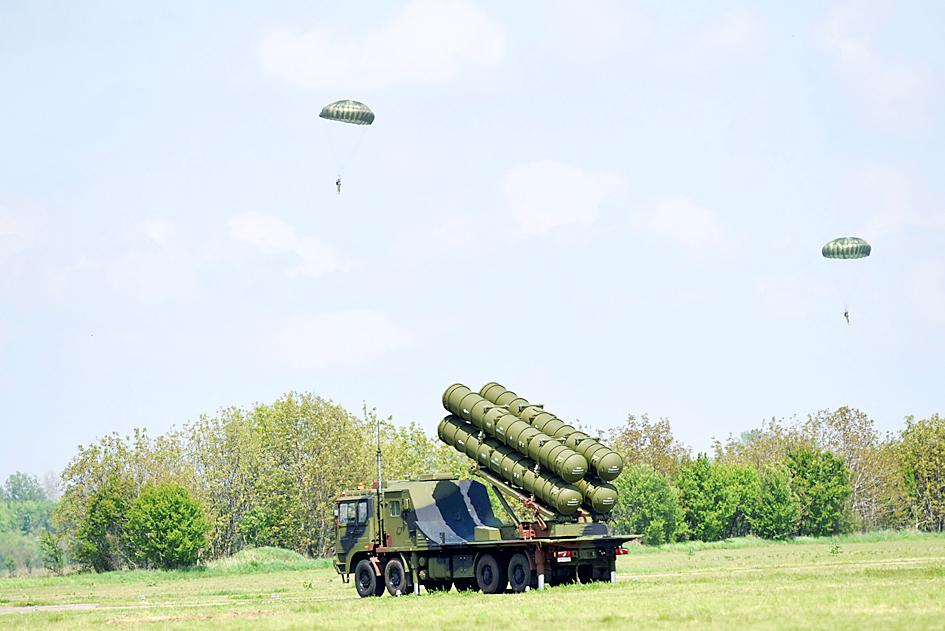Serbia on Saturday publicly displayed a recently delivered Chinese anti-aircraft missile system, raising concerns in the West and among some of Serbia’s neighbors that an arms buildup in the Balkans could threaten a fragile peace in the region.
The sophisticated HQ-22 surface-to-air system was last month delivered by a dozen Chinese air force Y-20 transport planes in what was believed to be the largest airlift delivery of Chinese arms to Europe in history.
Although Serbia officially seeks membership in the EU, it has been arming itself mostly with Russian and Chinese weapons, including T-72 battle tanks, MiG-29 fighter jets, Mi-35 attack helicopters and drones.

Photo: Reuters
In 2020, US officials warned Belgrade against purchasing HQ-22 missile systems, the export version of which is known as the FK-3, saying that if Serbia really wanted to join the EU and other Western alliances, it must align its military equipment with Western standards.
The Chinese missile system has been widely compared with the US Patriot and the Russian S-300 surface-to-air missile systems, although it has a shorter range than the more advanced S-300 system.
Serbia is the first operator of the Chinese missiles in Europe.
Serbian President Aleksandar Vucic said at the end of the arms display at a military airport near Belgrade that the Chinese missiles, as well as other recently delivered military hardware, are not a threat to anyone and only represent a “powerful deterrent” against potential attackers.
“We will no longer allow [ourselves] to be a punching bag for anyone,” Vucic said, apparently referring to NATO’s 78-day bombardment of Serbia for its bloody crackdown against Kosovo Albanian separatists in 1999.
Serbia, which was at war with its neighbors in the 1990s, does not recognize the independence that Kosovo declared in 2008.
It still has frosty relations with NATO members Croatia and Montenegro, as well as Bosnia, whose separatist Bosnian-Serb leader Milorad Dodik attended the military drill on Saturday.
Serbia is negotiating a purchase of French multipurpose Dessault Rafale jets, as well as British Eurofighter Typhoon fighters, Vucic said.
Only “political hurdles” would prevent the purchase of the Western aircraft, he added.
There are widespread concerns that Russia could push its ally Serbia into an armed conflict with its neighbors to try at least partly to shift public attention from the war in Ukraine.

INVESTIGATION: The case is the latest instance of a DPP figure being implicated in an espionage network accused of allegedly leaking information to Chinese intelligence Democratic Progressive Party (DPP) member Ho Jen-chieh (何仁傑) was detained and held incommunicado yesterday on suspicion of spying for China during his tenure as assistant to then-minister of foreign affairs Joseph Wu (吳釗燮). The Taipei District Prosecutors’ Office said Ho was implicated during its investigation into alleged spying activities by former Presidential Office consultant Wu Shang-yu (吳尚雨). Prosecutors said there is reason to believe Ho breached the National Security Act (國家安全法) by leaking classified Ministry of Foreign Affairs information to Chinese intelligence. Following interrogation, prosecutors petitioned the Taipei District Court to detain Ho, citing concerns over potential collusion or tampering of evidence. The

‘FORM OF PROTEST’: The German Institute Taipei said it was ‘shocked’ to see Nazi symbolism used in connection with political aims as it condemned the incident Sung Chien-liang (宋建樑), who led efforts to recall Democratic Progressive Party (DPP) Legislator Lee Kun-cheng (李坤城), was released on bail of NT$80,000 yesterday amid an outcry over a Nazi armband he wore to questioning the night before. Sung arrived at the New Taipei City District Prosecutors’ Office for questioning in a recall petition forgery case on Tuesday night wearing a red armband bearing a swastika, carrying a copy of Adolf Hitler’s Mein Kampf and giving a Nazi salute. Sung left the building at 1:15am without the armband and apparently covering the book with a coat. This is a serious international scandal and Chinese

Seventy percent of middle and elementary schools now conduct English classes entirely in English, the Ministry of Education said, as it encourages schools nationwide to adopt this practice Minister of Education (MOE) Cheng Ying-yao (鄭英耀) is scheduled to present a report on the government’s bilingual education policy to the Legislative Yuan’s Education and Culture Committee today. The report would outline strategies aimed at expanding access to education, reducing regional disparities and improving talent cultivation. Implementation of bilingual education policies has varied across local governments, occasionally drawing public criticism. For example, some schools have required teachers of non-English subjects to pass English proficiency

TRADE: The premier pledged safeguards on ‘Made in Taiwan’ labeling, anti-dumping measures and stricter export controls to strengthen its position in trade talks Products labeled “made in Taiwan” must be genuinely made in Taiwan, Premier Cho Jung-tai (卓榮泰) said yesterday, vowing to enforce strict safeguards against “origin laundering” and initiate anti-dumping investigations to prevent China dumping its products in Taiwan. Cho made the remarks in a discussion session with representatives from industries in Kaohsiung. In response to the US government’s recent announcement of “reciprocal” tariffs on its trading partners, President William Lai (賴清德) and Cho last week began a series of consultations with industry leaders nationwide to gather feedback and address concerns. Taiwanese and US officials held a videoconference on Friday evening to discuss the